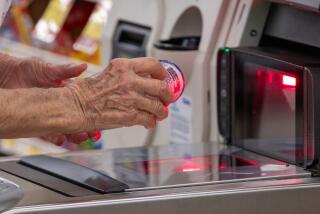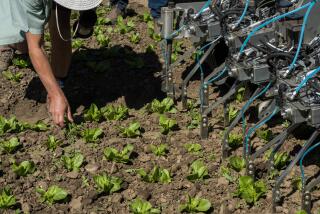Job Squeeze : High-Tech Cameras Leave Citrus Plant Workers Out of the Picture
For 27 years, Maria Garcia inspected and graded oranges at the Fillmore-Piru Citrus Assn. packinghouse.
The Fillmore resident was standing in front of a conveyor belt by 7 a.m. each day. For hours, she would look for scars and other damage to help her sort oranges into first, second and third quality.
Today, the same job is being done by four machines that not only grade and sort much faster than the packinghouse workers ever did but also examine the inside of the fruit, said Kenneth Creason, manager of the Fillmore-Piru Citrus Assn.
Garcia was one of 84 workers laid off a year ago when the 400 members of the Fillmore-Piru Citrus Assn. decided to buy four of the video camera devices, Creason said.
“I think that it was wrong for them to replace us with machines,” Garcia said. “I’m still unemployed, and it’s become hard to find jobs in packinghouses.”
But the packinghouse had no choice, Creason said. It had to make its operation more high-tech.
“It’s sad, but this is the only way that we can compete in a worldwide market,” he said. “We need to provide high-quality products at a low cost, and this is the way to do it. If we are going to have jobs, we need to be competitive.”
Dennis Bilton, director of research for Sunkist, agreed that the action was necessary. Sunkist markets oranges grown by farmers who belong to the Fillmore-Piru Citrus Assn.
In the past three years, the shipments of citrus from countries in the Middle East have increased, Bilton said. “And those countries have the ability to sell products at a lower cost than us because the price of their land and labor rates are lower than ours,” he added.
In Piru, each of the four machines is made up of 12 tiny video cameras that hang above the 24 conveyor tracks at the 130,000-square-foot packinghouse. Each camera photographs five oranges per second, Creason said.
Once the photograph is taken, the camera sends the image as a code to a computer system linked to the tracks.
The computer reads the messages and grades the fruit into extra fancy, Sunkist, choice and juice categories and then distributes the oranges into different containers.
Developed by Exeter Engineering in Exeter, Calif., the optical-defect grading machines are custom-built for individual packinghouses, said Stan Hawkins, an Exeter sales manager.
“The demand for high-tech equipment is increasing because the industry has to produce high-quality products and it has to keep its costs low,” Hawkins said. “Every company that orders them ends up saving about 75% in labor costs.”
It takes an average of one to two years for a company to pay for one of the video cameras, which can cost more than $1 million, Hawkins said.
Since the Fillmore-Piru Citrus Assn. began to use the grading machines last summer, it has saved thousands of dollars, Creason said.
But “the savings do not mean an increase in revenues, because we have had a tremendous decrease in our sales,” Creason said. “Right now, we are trying to maintain quality and keep the entire operation in business.”
Although the grading machines are considered extremely reliable, the Piru plant has kept about 15 employees who double-check the fruit after it has been graded, Creason said.
Other packinghouses in the county--such as the two owned by the Limoneira Co.--use similar equipment to sort lemons by color and size.
Pete Dinkler, manager of one of the Limoneira packinghouses, said the replacement of workers with machines has been gradual.
“Thirty-five years ago, everything was done by hand,” Dinkler said. “Now, much of it is done by machines. And that’s just a trend that will continue.”
More to Read
Inside the business of entertainment
The Wide Shot brings you news, analysis and insights on everything from streaming wars to production — and what it all means for the future.
You may occasionally receive promotional content from the Los Angeles Times.










